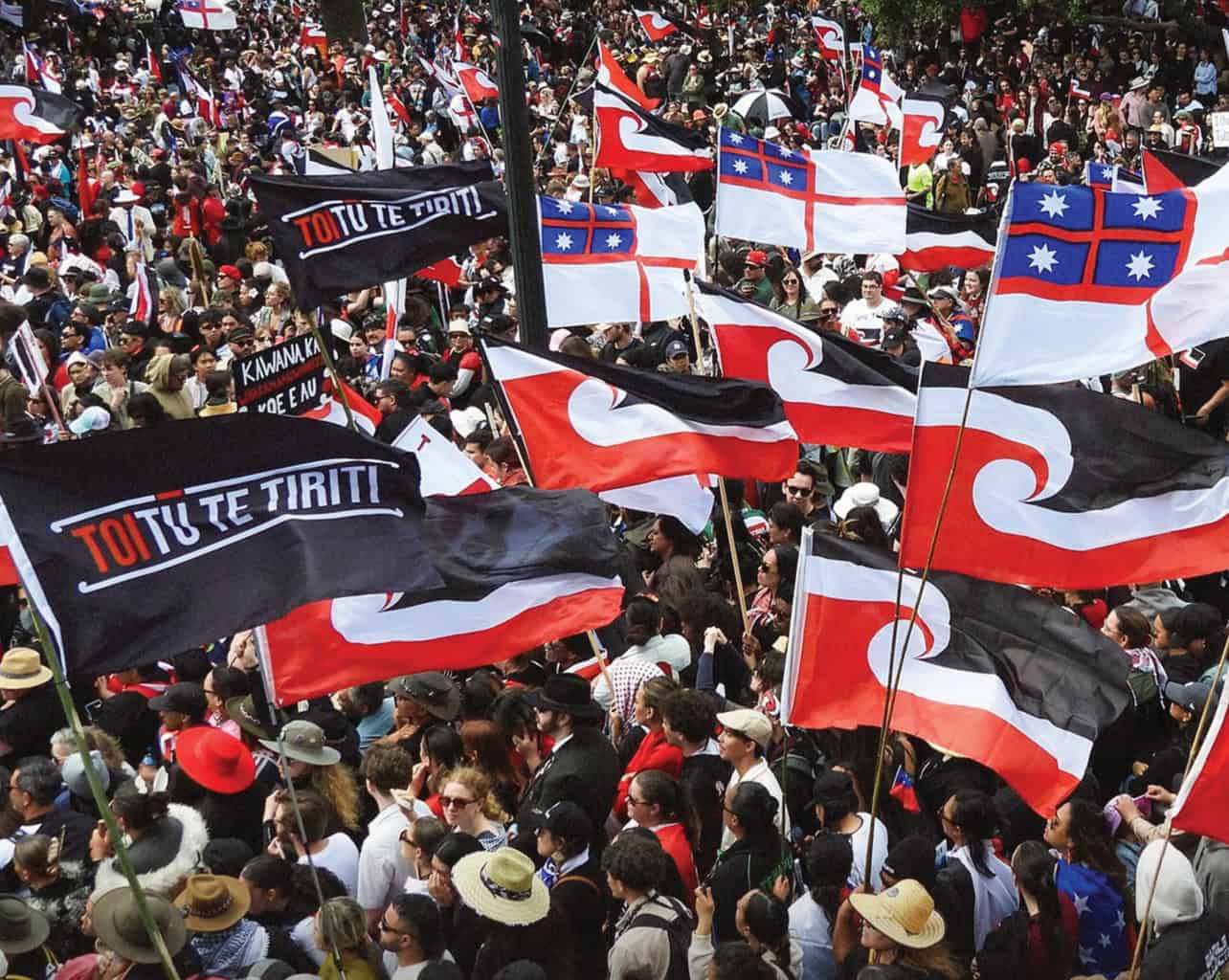Once Colonized The Māori Demand Justice And the Protection Of Rights
During late November the Māori people of New Zealand and their supporters, approximately 42,000, protested against the right-wing government’s abrogation of the 1840 treaty of Waitangi to include Māori representation. According to activists such an act would invalidate many civil rights afforded to the Māori people. Gideon Porter, Māori issue journalist said about parliament rescinding the treaty, this is “attempt to redefine decades of exhaustive research and negotiated understandings of what constitute ‘principles’ of the treaty”.
The treaty is considered New Zealand’s founding document. It was signed between representatives of the British Crown and 500 Māori chiefs, making New Zealand a British colony. The treaty was written in English and the te reo language of the Māori people. Allegedly it promised Māori the same rights and privileges as British citizens. The English and Māori versions, according to pundits, have a vast difference in the text of the treaty. According to Jurist News it is the Māori text, signed in 1840 by the overwhelming majority of rangatira (chiefs) and recognized at international law, that takes precedence.
The Māori are the original people of the two large islands now known as New Zealand having lived there for multiple centuries. Al Jazeera noted experts say that the Māori came to the uninhabited islands of New Zealand in the 1200s. Over hundreds of years of isolation, they developed their own distinct culture and language.
The two islands were originally called Aotearoa by the Māori. The name New Zealand was given to Aotearoa by British colonizers who took control under the treaty in 1840.
Under the treaty Indigenous people were often barred from practicing their culture. According to various sources in the decades after the signing of the treaty, much of Māori land and natural resources were taken through schemes for increased European settlement such as those of the New Zealand Company. The directors were influential men in London commerce.
“The English draft talks about the British settlers having full authority and control over Māori in the whole country,” Kassie Hartendorp, a Māori community organizer and director at community campaigning organization ActionStation Aotearoa told Al Jazeera. Jurist News noted the English version stated that Māori ceded “absolutely and without reservation all the rights and powers of Sovereignty.” It limited the promise of what the Tribunal describes as the highest form of political authority relevant to Māori to “full, exclusive, and undisturbed possession” as well as the scope of that protection to “Lands and Estates Forests and Fisheries and other properties which they may collectively or individually possess.” Nevertheless, the Waitangi Tribunal found in the Te Paparahi o Te Raki Inquiry that Māori signatories to Te Tiriti o Waitangi did not cede their sovereign law making powers.
Hartendorp continued explaining that the te reo version includes the term “kawanatanga”, which in historical and linguistic context “gives British settlers the opportunity to set up their own government structure to govern their own people but they would not limit the sovereignty of indigenous people”.
“We never ceded sovereignty; we never handed it over. We gave a generous invitation to new settlers to create their own government because they were unruly and lawless at the time,” said Hartendorp.
What the Māori people experienced is indistinguishable from the experiences of oppressed people around the world. The manipulation of the constitution of India to invalidate the right of Self Determination for the Kashmiris, the forced displacement of the Rohingya of Rakhine State in Myanmar by the government are two examples. Historically the indigenous people of North America and Canada experienced a life of broken treaties – all are examples of disregard for the right to exist.
A proposed law, modification to the treaty, by David Seymour, a Māori, would avail equality for all New Zealanders. Activists see a disadvantage along the Waitangi Tribunal, a permanent body to adjudicate treaty matters, saying “this will lead to the erosion of Māori rights”. A statement by ActionStation Aotearoa says that the bill’s principles “do not at all reflect the meaning” of the Treaty of Waitangi. Māori politicians articulate the only people that can make changes are the parties of signatory.
Along with formerly colonized people around the world, such as in West Africa, the Māori have experienced a renaissance. Inclusive is their language, spoken among Māori and non-Māori. Their November protest raised social consciousness to injustice.
Based on the pulse of the country, the bill is not expected to pass.
By El Hajjah Anisa

